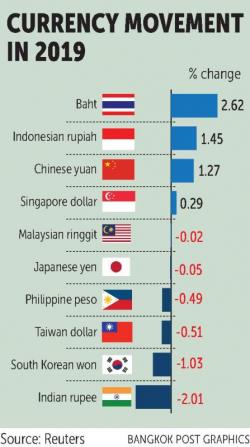Thailand – BoT: Baht climbs as greenback slips
The baht’s rising value is a result of the US dollar depreciation, stemming from domestic political developments in the world’s largest economy, says the Bank of Thailand.
The Sino-US trade disputes have also affected the overall atmosphere of global trade and investment, said Chantavarn Sucharitakul, assistant governor for corporate strategy and relations group at the central bank.
 The baht was at 31.76 against the greenback as of press time on Wednesday.
The baht was at 31.76 against the greenback as of press time on Wednesday.
According to Reuters, the baht’s year-to-date appreciation is 2.62%, making it the best performing currency in Asia.
“This is a good opportunity for Thai businesses to benefit from the stronger baht by importing machinery and equipment to enhance productivity, reduce cost and create more value for their products. This will increase the competitiveness of Thai merchandise and support Thai businesses with greater pricing power,” said Mrs Chantavarn.
“There are high uncertainties going forward. Businesses should emphasise foreign exchange management such as forex forwards and options for hedging, foreign currency deposits or goods invoices using local currencies instead of the US dollar.”
Earlier Visit Limlurcha, vice-chairman of the Thai National Shippers’ Council, said exports in the last three months of 2018 show Thailand’s shipments have been affected by the escalating trade war, especially for products Thailand ships to China to be assembled and re-exported to the US, such as electric circuits, electronics and components.
The baht’s higher value was also not beneficial to exports, Mr Visit said.
Exports fell for a second straight month in December, dropping the full-year performance for 2018 to 6.7% growth and missing the 8% target set by the government.
“The baht’s value could strengthen to 31.2-31.3 against the dollar this quarter, and could reach the strongest level on April 19, when the local currency usually appreciates the most based on historical data,” said Kobsidthi Silpachai, head of capital markets research at Kasikornbank.
Capital inflows expected in April are attributed to investments and a tourism influx, he said.
Separately, the IMF’s lower global GDP growth outlook is in line with the Bank of Thailand’s assessment of slower global economic growth this year, said Don Nakornthab, senior director of the economic and policy department at the central bank.
The IMF has reduced its GDP growth forecast to 3.5% and 3.6% for 2019 and 2020, respectively, from October’s estimates of 3.7% for both years. The outlook is based on economic growth drivers slowing near the end of 2018, while effects of the Sino-US trade disputes have become clearer, said Mr Don.
Uncertain political developments in Europe adds to lower economic growth momentum, he said.
“A slowdown in the global economy is the main reason the Bank of Thailand has lowered its export forecast and Thailand’s GDP growth projection for last year and this year,” said Mr Don.
“The central bank projects this year’s exports will grow 3.8%, which is below the Commerce Ministry’s target [of 8%].”
Asean economies, including Thailand, will continue to face a downturn in global trade this year from the Sino-US trade disputes and slower economic growth in developed economies, said Siam Commercial Bank’s Economic Intelligence Unit (EIC).
Economic growth is anticipated to gain traction from domestic demand, said the EIC.
Source: https://www.bangkokpost.com/business/finance/1616686/bot-baht-climbs-as-greenback-slips


 English
English




